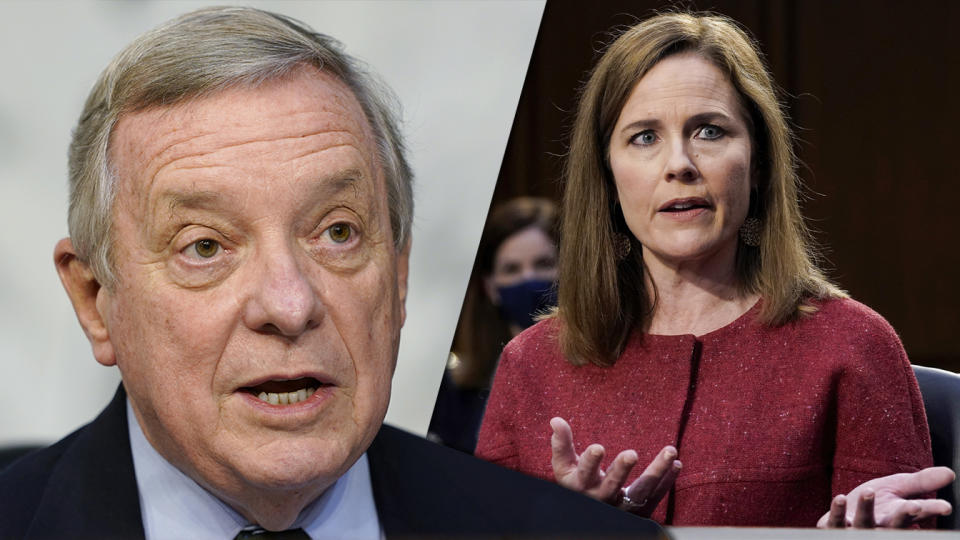Barrett grilled on views about felons' right to own guns — and to vote
During day two of her confirmation hearing on Tuesday, Supreme Court nominee Amy Coney Barrett faced scrutiny over one of her most noteworthy past opinions on whether felons should be banned from owning firearms.
Sen. Richard Durbin, D-Ill., asked Barrett about what he described as her belief that banning felons from voting is permissible under the Constitution, but prohibiting them from owning firearms is unacceptable. “I think the right to vote should be given at least as much respect as the 2A right,” Durbin said. “Do you?”
Barrett pushed back at the premise of Durbin’s question, telling him and other members of the Senate Judiciary Committee that she has expressed no view on whether states are right or wrong to ban felons from voting.
The questioning stems from Barrett’s dissenting opinion in a 2019 appeals court case in which she disagreed with a ruling that prohibited a felon from owning a firearm in Wisconsin.
The 2019 gun rights case, Kanter v. Barr, in the U.S. Court of Appeals for the Seventh Circuit centered on the right of a Wisconsin man, Rickey Kanter, to own a firearm after he had served a sentence for a mail-fraud conviction. In that case, the appeals court agreed with the district court that keeping felons from possessing firearms is related to the “important governmental objective of keeping firearms away from those convicted of serious crimes,” the decision said.
Barrett dissented in the case, writing that while legislatures have the power to prohibit dangerous people from possessing guns, that power “extends only to people who are dangerous. Founding-era legislatures did not strip felons of the right to bear arms simply because of their status as felons.”

Barrett used voting rights as an example, writing that “a state can disenfranchise felons, but if it refrains from doing so, their voting rights remain constitutionally protected. So too with the right to keep and bear arms, a state can disarm certain people ... but if it refrains from doing so, their rights remain constitutionally protected.”
At the hearing, Durbin said he was troubled by Barrett’s opinion on Kanter. He talked about voter suppression and said that during the Reconstruction and Jim Crow eras, and even today, felony convictions were used to disqualify African-Americans from voting.
“The reason I raised that is that in your dissent you said disqualifying a person from voting because of a felony is OK. But when it comes to possession of firearms we’re talking about the individual right of [the] Second Amendment. What we’re talking about in voting is a civic right. A community right. However you define it. I don’t get it.”
Barrett said Durbin might have been taking her statements out of context. Her opinion said that states have the freedom to prohibit felons from voting.
“The suggestion that I have some agenda,” she later told Durbin, “I assure you that I do not.”
After Durbin finished, Sen. Mike Lee, R-Utah, seemed to come to Barrett’s defense.
“I’m thrilled that we’ve got a jurist who is willing — when looking at somebody whose constitutional rights are about to be taken away — thrilled to have a jurist who is willing to consider a pre-deprivation review for that individual.”
_____
Read more from Yahoo News:

 Yahoo Sports
Yahoo Sports 
